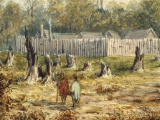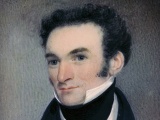Historic NZ events in February
Feb
1842 New Zealand Company settlers arrive in Nelson
The Fifeshire arrived in Nelson with immigrants for the New Zealand Company's first settlement in the South Island.
Read more...1922 Correspondence School founded
Janet Mackenzie became the first teacher in what was to become the Correspondence School for Back-block Children
Read more...1981 Trevor Chappell bowls underarm
Trans-Tasman sporting relations hit a new low at the Melbourne Cricket Ground when Australian captain Greg Chappell ordered his brother Trevor to bowl the final delivery of a 50-over cricket international against New Zealand underarm (along the ground).
Read more...Feb
1939 Welfare plan gets baptism of fire
A massive fire destroyed the nearly completed three-storey Social Security building. Just seven weeks later, a replacement building was opened by Prime Minister Michael Joseph Savage.
Read more...1974 'The greatest middle distance race of all time'
The men’s 1500-m final was run on the last day of the 1974 Christchurch Commonwealth Games. Tanzanian Filbert Bayi ran the first 800 m in an astonishing 1 minute 52.2 seconds, conserved energy on the third lap, and held off 22-year-old New Zealander John Walker to set a new world record of 3:32.16.
Read more...Feb
1868 Killer storm sweeps the country
An ex-tropical cyclone swept south across the country from Saturday 1st. By the time it moved away on Tuesday 4th, more than 40 people had died.
Read more...1931 Deadly Hawke's Bay earthquake
When the earthquake, measuring 7.8 on the Richter scale, struck at 10.47 a.m., many buildings in central Napier and Hastings collapsed.
Read more...Feb
1975 First woman swims Cook Strait
American Lynne Cox swam from the North Island to the South in 12 hours 7 minutes. The fourth person to do so, she battled heavy seas and strong winds.
Read more...1985 USS Buchanan refused entry to New Zealand
New Zealand's Labour government refused the USS Buchanan entry because the United States would neither confirm nor deny that the warship had nuclear capability.
Read more...Feb
1867 Opening of railway from Invercargill to Bluff
The 27-km line between Invercargill and Bluff was the third public railway in New Zealand. Southland's railway ambitions helped drive the province into bankruptcy.
Read more...1911 New Zealand’s first controlled powered flight
Pioneering aviator Vivian Walsh took to the skies over South Auckland for the first successful flight in New Zealand.
Read more...1994 First Big Day Out in New Zealand
The Big Day Out, an Australian franchise based on the successful Lollapalooza model, brought alternative, hard rock, hip hop and, more recently, dance acts together in a one-day festival in Auckland.
Read more...Feb
1840 Treaty of Waitangi signed
More than 40 Māori chiefs signed a treaty with the British Crown in the Bay of Islands. The Treaty of Waitangi remains controversial.
Read more...1871 First public girls' secondary school
The first public girls’ secondary school in the southern hemisphere was Otago Girls’ High School, which opened eight years after the local public boys’ high school.
Read more...1947 Liner Wanganella refloated in Wellington Harbour
The liner, carrying 400 passengers, struck Barrett Reef in Wellington Harbour on 19 January. Only an unusually long spell of calm weather - dubbed 'Wanganella weather' by locals - saved it from becoming a total wreck.
Read more...Feb
1963 Fifteen die in Northland bus tragedy
Fifteen people were killed and 21 injured, many severely, when a bus returning to Auckland from Waitangi Day celebrations in the presence of Queen Elizabeth II and Prince Philip lost its brakes on Brynderwyn hill
Read more...1863 New Zealand’s worst shipwreck
For the British it was the costliest day of the New Zealand Wars – but it occurred far from the battlefield. Bringing naval stores from Sydney, the modern 1706-ton steam corvette HMS Orpheus ran aground on the bar at the entrance to Auckland’s Manukau Harbour.
Read more...Feb
1915 Turkish ambush kills New Zealand seaman
Able Seaman William Edward Knowles became one of the first New Zealanders to die in the First World War as a result of enemy action.
Read more...1931 First fatal accident on a scheduled air service in New Zealand
All three people on board a Dominion Airlines Desoutter died when it crashed near Wairoa in northern Hawke’s Bay.
Read more...1972 Women cricketers triumph
New Zealand’s women cricketers achieved their first test victory at the 17th attempt. They had lost seven and drawn nine of their previous tests, all against either England or Australia.
Read more...Feb
1770 Cook completes circumnavigation of North Island
The Endeavour's arrival at Cape Turnagain confirmed that the North Island was indeed an island, not part of a fabled great southern continent.
Read more...1900 Wanganui Opera House opened
The large wooden building on St Hill Street has been a jewel in Whanganui’s crown for more than a century.
Read more...Feb
1967 End of free school milk
New Zealand schoolchildren received free milk between 1937 and 1967. The first Labour government introduced the scheme – a world first – to improve the health of young New Zealanders (and make use of surplus milk).
Read more...Feb
1864 Charles Heaphy earns Victoria Cross
Recommended for a Victoria Cross after rescuing a soldier under fire at Waiari, near Pirongia, Charles Heaphy was given the decoration in 1867.
Read more...Feb
1909 SS Penguin wrecked in Cook Strait
The Picton-Wellington ferry SS Penguin struck rocks in Cook Strait and sank in heavy seas off a rugged, isolated coast. Only 30 of the 102 people on board survived.
Read more...Feb
1869 Killings at Pukearuhe
A Ngāti Maniapoto war party sacked the redoubt at Pukearuhe (White Cliffs) in northern Taranaki, killing military settlers, family members and the missionary John Whiteley.
Read more...1974 New Zealand soldier's brave sacrifice
Sergeant Murray Hudson died attempting to save the life of another soldier during a live grenade training exercise at Waiōuru military camp.
Read more...1983 Lance Cairns hits six sixes at Melbourne Cricket Ground
At 44 for 6 in reply to Australia’s 302, New Zealand was heading for an embarrassing defeat in the second final of the Benson & Hedges World Series Cup when Lance Cairns took guard with his bat, ‘Excalibur’.
Read more...Feb
1915 Māori soldiers sail to war
Imperial policy initially prevented 'native peoples' fighting in a war between European powers. In February 1915, however, a 500-strong Maori Contingent left Wellington for Egypt.
Read more...1998 Te Papa museum opens
New Zealand’s new national museum, the Museum of New Zealand Te Papa Tongarewa, was officially opened on Wellington’s waterfront after a decade of planning and construction.
Read more...Feb
1882 First frozen meat shipment leaves New Zealand
New Zealand’s first successful shipment of frozen meat to Britain in 1882 had a huge impact on the colony, paving the way for the trade in frozen meat and dairy products that became the cornerstone of New Zealand’s 20th-century economy.
Read more...1978 New Zealand beats England in a cricket test for the first time
Chasing 137 for victory in the first test at the Basin Reserve in Wellington, England was bowled out for 64, with Richard Hadlee taking 6 for 26.
Read more...Feb
1770 Cook sights Banks 'Island'
Lieutenant James Cook sighted Banks Peninsula from the Endeavour. The following day he decided it was an island, which he named for the expedition's botanist, Joseph Banks.
Read more...1986 Sinking of the Mikhail Lermontov
At 5.37 p.m. on 16 February 1986, the Soviet cruise liner Mikhail Lermontov hit rocks off Cape Jackson in the Marlborough Sounds.
Read more...Feb
1873 'The Russians are coming!'
On 17 February 1873, Aucklanders awoke to the alarming news that a Russian warship had entered Waitematā Harbour undetected and landed troops.
Read more...Feb
1957 New Zealand's last execution
Walter Bolton, a 68-year-old Whanganui farmer, became the last person executed in New Zealand.
Read more...1982 'Queen of Crime' Ngaio Marsh dies
Ngaio Marsh, one of the 'Queens of Crime' in the 1920s and 1930s, died just weeks after submitting her 32nd detective novel, Light thickens, to her publishers. She was also an artist, playwright, actor and director.
Read more...Feb
1938 Kōpuawhara flood kills 21
Twenty men and one woman drowned when a cloudburst sent a wall of water surging through a public works camp in the Kōpuawhara Valley, near Māhia.
Read more...Feb
1914 Scotland crosses Southland in pioneering flight
J.W.H. Scotland flew a Caudron biplane from Invercargill to Gore, the first cross-country flight in New Zealand.
Read more...1954 Yvette Williams sets world long jump record
Eighteen months after winning the long jump at the 1952 Helsinki Olympics, Williams set a new world record of 20 feet 7½ inches (6.29 m) at an athletics meeting in Gisborne.
Read more...Feb
1879 Kaitangata mining disaster
On the morning of 21 February 1879, an explosion rocked the coal mine at Kaitangata, South Otago.
Read more...Feb
1902 Kelburn cable car opens
Wellington's iconic cable car was built to provide residents of the developing hill suburb of Kelburn with quick access to and from downtown Lambton Quay.
Read more...2011 Christchurch earthquake kills 185
At 12.51 p.m. on Tuesday 22 February 2011, a magnitude 6.3 earthquake caused severe damage in Christchurch and Lyttelton, killing 185 people and injuring several thousand.
Read more...Feb
1904 First step in creation of Fiordland National Park
Nearly 1 million ha of far western Southland and Otago was set aside as a national reserve.
Read more...1940 100,000 Aucklanders welcome home HMS Achilles
The Battle of the River Plate in December 1939 was the Allies’ first naval victory of the Second World War. The involvement of the cruiser HMS Achilles, more than half of whose crew were New Zealanders, was greeted with jubilation in New Zealand.
Read more...Feb
1902 Battle of Langverwacht Hill
Twenty-four New Zealanders were killed in this battle during the South African (Boer) War. A total of 230 New Zealanders died while serving in New Zealand's first overseas war.
Read more...1912 TSS Earnslaw launched on Lake Wakatipu
For more than a century, the TSS Earnslaw has carried freight and people to and from remote settlements on the shores of Lake Wakatipu.
Read more...Feb
1943 49 killed in Featherston POW incident
Just outside the Wairarapa town of Featherston, a memorial garden marks the site of a Second World War incident that resulted in the deaths of 48 Japanese prisoners of war and one guard.
Read more...Feb
1844 'Pistols at dawn': deadly duel in Wellington
William Brewer died of wounds received during a pistol duel with another Wellington lawyer, H. Ross, on 26 February 1844. The duel followed a quarrel over a case in the Wellington County Court.
Read more...Feb
1951 Troops deployed in waterfront dispute
The waterfront dispute of 1951 was the biggest industrial confrontation in New Zealand’s history, lasting for five months, from February to July. At its peak, 22,000 waterside workers and other unionists were off the job.
Read more...Feb
1945 Kiwi soldier faces firing squad
After more than a year on the run in northern Italy, New Zealand prisoner of war David Russell was recaptured and executed. His courage in the face of death earned him the first George Cross awarded to a member of New Zealand’s military.
Read more...Feb
1924 Intelligence tests arrive in New Zealand schools
Following a US study tour by Frank Milner, the rector of Waitaki Boys’ High School in Ōamaru, the Education Department began applying the Terman Group Test of Mental Ability to all first-year post-primary school students
Read more...1964 Opening of first road to Maungapōhatu
A milling road provided the first vehicle access to the tiny Urewera settlement of Maungapōhatu – famous as the former home of the prophet Rua Kēnana
Read more...2004 The return of the king wins 11 Oscars
Peter Jackson’s last film in the colossal Lord of the rings trilogy, The return of the king, won all 11 Oscars it was nominated for at the 76th Academy Awards in Los Angeles.
Read more...




























































